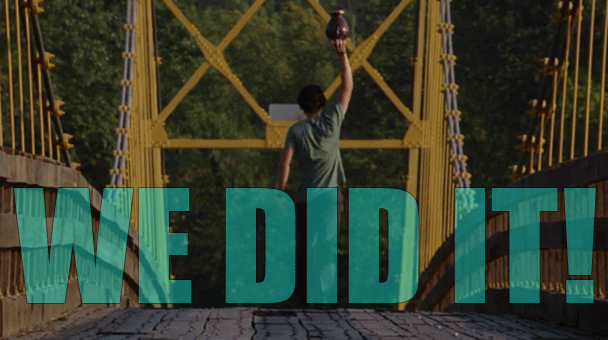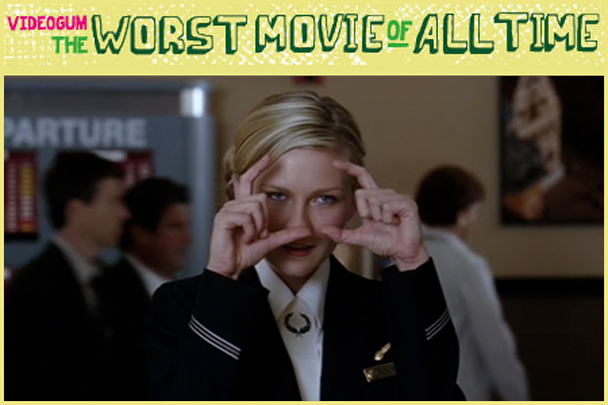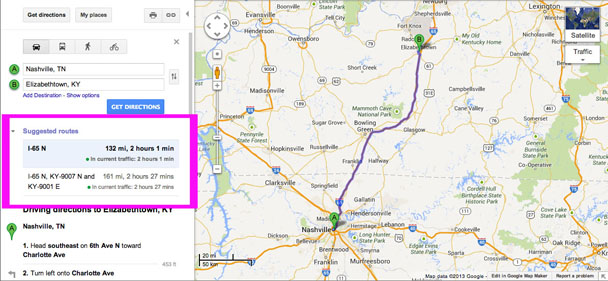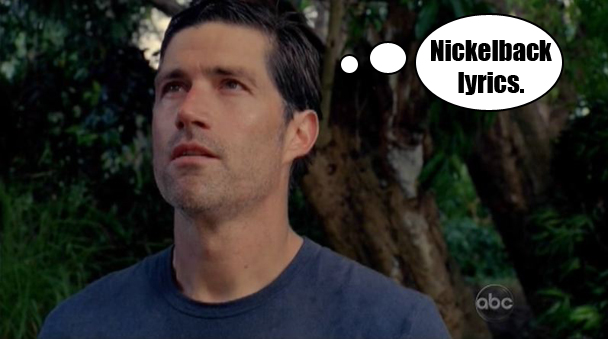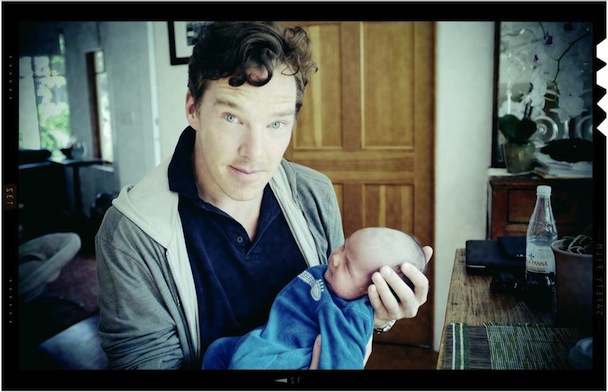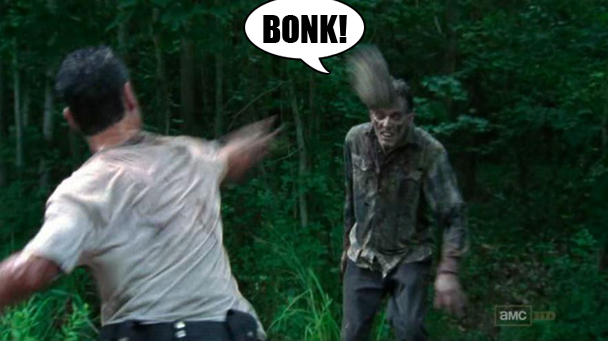After Roger Ebert died, Terry Gross replayed some of their old interviews onFresh Air. In one of them he talked about how he would rewatch Fellini's La Dolce Vita every 10 years, and how his perception of the movie evolves with his own life experience:
When I saw it in 1960, there was this 30-year-old journalist in Rome leading this unbelievably glamorous life with all these celebrities and staying up all night and going to orgies and having all of his philosophical friends around him and his wives and his mistresses and miracles and stories to cover.
When I saw it again - and I've seen it every 10 years - in 1970, it was somebody about my age, only he was leading a more interesting life than I was, I thought. And when I saw it again in 1980, it was somebody 10 years younger than I was, and he had a lot of problems that I had outgrown.
I thought that was a really beautiful and poignant observation about the way in which our subjective experience and prism of our own lives affects how we relate to art, and it was with that in mind that I decided for this final installment of The Hunt for the Worst Movie of All Time to revisit the reigning champion. Would it be was as bad as I remembered, or perhaps, with the benefit of hard-earned wisdom and the shifting perspective that comes with age, would it be even worse?
It's fitting that the very first line of Elizabethtown, delivered by Orlando Bloom in voice over, is a line about collosal failure. The actual line is "As somebody once said, there’s a difference between a failure, and a fiasco." Of course, we never learn who coined this famous quote because no one did. (Lie #1.) It's also never made clear what the proposed difference is between a failure and a fiasco, so for the sake of argument, let's just say that Elizabethtown encapsulates both.
In it, Drew Baylor (Orlando Bloom) is a celerity shoe designer (Lie #2, there is no such thing. We are 30 seconds into the movie at this point) who we learn is responsible for the design of a shoe called SPASMOTICA (!!!!) for a company that is clearly supposed to be Nike but in the world of the movie is called Mercury Worldwide Shoes. Really? Virtually all of the world's leading brands of athletic shoes have a single, enigmatic name: Nike, Adidas, Asics, Reebok, Puma, Saucony, and the best you could come up with is Mercury Worldwide Shoes? For a movie that wants so badly to be about what life is really like, it sure doesn't seem to have the first clue. Anyway, everyone thought Spasmotica was going to be the next Air Jordan, which makes sense since they sound equally cool, but for a reason that is never given to us, despite the fact that it is the engine that drives our main character for the next two hours, the shoes have all been recalled. Perhaps the reason we never learn why the shoes get recalled is that shoes don't get recalled. (Lie #3). As a result, Mercury Worldwide Shoes (LOL) has suffered a net loss of almost one billion dollars, and all of the blame and responsibility, we are told, falls onto the shoulders of Orlando Bloom, despite the fact that he is a mid-level designer who works in a cubicle at a mulit-national corporation full of executives in charge of making decisions. (Lie #4.) We are now just 45 seconds into the movie.
Depressed and despondent, Drew goes home with the intention of killing himself. This is a professional, high-level industrial designer who despite his setback was only recently considered a genius, but the best he can come up with for his own suicide is duct-taping a chef's knife to the handlebars of his exercise bike.

A knife, incidentally, that he finds in a drawer filled with loose knives.
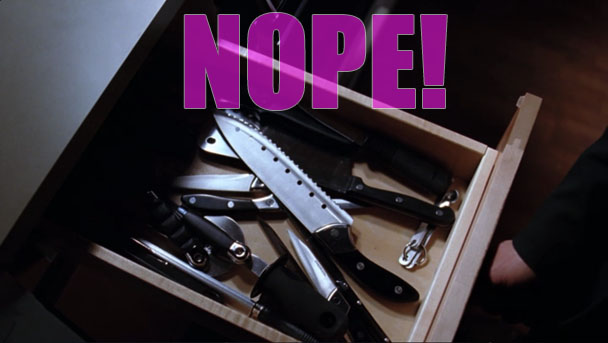
Have you ever been to a designer's house? There are no drawers filled with loose knives. Everything is in its perfect, efficient, beautiful place. Two seconds later, the tape holding the knife to the exercise bike, which again, he is going to use to commit suicide, comes loose and the knife falls out. No wonder he lost his job at Mercury Worldwide Shoes! He is terrible at his job! Knife back in place, Drew is ready to bike-stab himself to death when his cell phone rings, which is when we learn that Drew, the forward-thinking wunderkind designer, has a 100-year-old flip phone with a Motown ringtone. Between the bike-knife as a concept, the failed bike knife construction, the loose knife drawer, the phone, and the ringtone, we are looking at Lies #5, #6, #7, #8, and #9. We are five minutes into the movie. I'm going to stop counting now, but I will continue to describe some of the lies as they occur.
Drew's father, Mitch, has died while on a trip home to visit his family in Kentucky, so Drew puts off his suicide for the weekend while he goes to retrieve his father's body. That is actually his plan: that he will go to Kentucky, cremate his father, fly back with his ashes, and then get back on the knife-bike. It's a goal that he reiterates right up until the movie's final 10 minutes. As such, it's unclear why someone with such intense and determined suicidal ideation would care in the least about accomplishing goals, however short-term. Perhaps this can only make sense in a world where the most successful athletics company on the planet is called Mercury Worldwide Shoes.
On his flight to Kentucky, which is completely empty, like, completely, a thing that has never occurred in the history of air travel and which, if it did occur, would result in the cancellation of Drew's flight, he meets a flight attendant, Claire (Kirsten Dunst), who will become his love interest. She is a woman in a movie, and therefore she is supposed to be quirky and charming and maybe a little bit crazy, all of which seems to really annoy Drew. Again, if Drew is intent on killing himself, it is hard to understand why he bothers engaging with life long enough to be "annoyed" with people. Whatever. Fuck Drew.

He gets to Kentucky and meets his father's "wacky" family, who he has supposedly never really gotten to know, despite the fact that we are told throughout the movie how much Mitch loved Kentucky and how much Kentucky loved Mitch right back. I guess you never do know how other people's families operate, but this still seems off. There is supposedly some festering animosity because Drew's mother (Susan Sarandon, who can basically do no wrong, but who also reminds us, with this movie and her weird New York ping pong bar that she bought for her 23-year-old boyfriend or whatever, that no one is perfect not even Susan Sarandon) "made" Mitch and the family move to California, but that doesn't explain why the family never at least went back to visit Kentucky WITH Mitch who would obviously still go back there, since that is where he died? But, OK, if we accept that it's true that Drew hasn't been to Kentucky since he was a kid despite his father's overwhelming attachment to it, and that Drew doesn't have a relationship with anyone there, and also that he gets lost for hours on the way from the Louisville airport, then why did the entire town organize a hero's welcome and how did they know when to throw it?
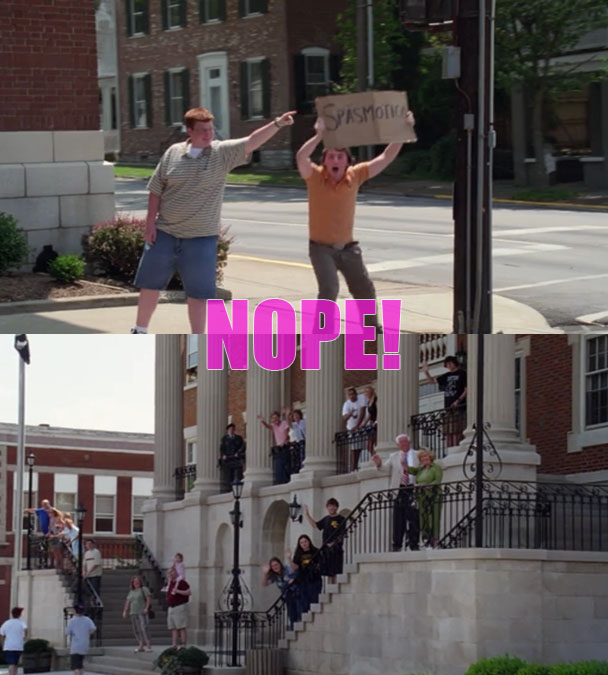
P.S. Drew's aunt is Paula Deen.
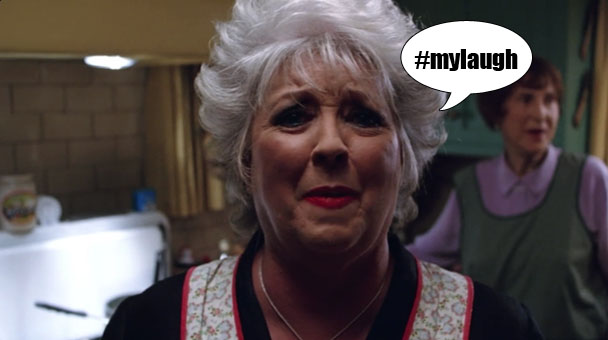
This movie is perfect.
That night at the hotel, Drew calls his mother and his sister and his ex-girlfriend, but no one answers the phone. Desperate, he calls Claire and they end up talking for hours. AGAIN: why does someone who plans on killing himself feel like chatting on the phone with anyone who will have him? It would be one thing if these calls were a desperate cry for help, but they're just inane small talk. (Then again, everyone Drew talks to on the phone is equally insane about it. Like, his sister calls to beg him to come home even though she's going to be in Kentucky two days later, and his ex-girlfriend calls him to tell him that she doesn't have time to talk but so why did she call him if she didn't have time and also was breaking up with him? What a movie about space aliens.) Here are actual quotes from his supposed all-night phone call with Claire (during which he wears three different pairs of socks for some reason?):
Claire: Did you ever just think, I’m fooling everybody?
Drew: You have no idea.
AND:
Claire: I think I've been asleep most of my life.
Drew: Me too.
AND:
Drew: That's what they say, at least.
Claire: I've always wondered this, who are "they"?
Drew: And who says we have to listen to "them"?!
Claire: "They" do!
It's two very inane people having a very trite conversation composed entirely of very lazy cliches suddenly realizing that they are made for each other, which is itself an inanely trite cliche. They talk for so long that Claire, who is in Nashville, suggests they meet halfway to watch the sunrise. "You're only 45 minutes away," she says.
NOPE! Click to enlarge Lie #1,098,982.
Now they are in love. They flirt and court and spout nonsense and go shopping for urns and eventually they fall into bed together as a movie couple should. The whole thing is supposed to be very romantic. And it is, if you are not paying attention to the actual movie. The morning after they sleep together, Claire keeps trying to wake Drew up to say goodbye, but he is a deep sleeper, so she just sneaks out of the room. Uh, you can wake someone up if you want. It's doable. But, so, everything is hitting all the right rom-com buttons when he runs out of the hotel in his bare feet to catch her before she leaves and she turns around and says "Why don't you just admit that you love me?" Except, here's the thing: when they slept together, Claire was cheating on her boyfriend. And instead of Drew telling her that he loves her, he goes into this long, self-indulgent speech about shoes and money that ends with him admitting that he for sure still (STILL!) plans on killing himself at the end of the weekend. To which she responds that he's "an artist" (!!!!). So, you know, fuck Drew AND Claire.
By all accounts, this was a very "personal" movie for Cameron Crowe, or at least that is what he told everyone when he made it. From The Milwaukee Journal Sentinel
“I always thought I’d write about my dad, at some point,” said Crowe, whose late father was from Kentucky. “I didn’t think it would be like this, but it arrived like this. I’d been listening to a lot of Garrison Keillor at the time. I love that simple story that ends on a grace note and you go, ‘Wow, I’m just happy to be alive right now.’ That was the feeling I was chasing.”
OK. That's a perfectly reasonable feeling to chase as a filmmaker. Everybody loves that feeling! And the thing about Elizabethtown is that there is actually, buried somewhere deep inside of it, a good movie about family and love and loss and moving forward. It's just buried under so many recalled pairs of SPASMOTICAS. If Cameron Crowe wanted to write about his dad, why didn't he? There are two moments in Elizabethtown where Drew gets lost in memories of his father: the first memory is the two of them dancing around an empty house on moving day, and the second is his dad buckling his seatbelt. REALLY?! That's the BEST either Drew or Cameron Crowe could come up with? For a personal movie ABOUT a dad? Good grief. And it's this combination of this bland, completely generalized and cliche depiction of the human emotional experience, combined with the myriad lies thrown in for "color" that makes this such a failure. Or is it fiasco?
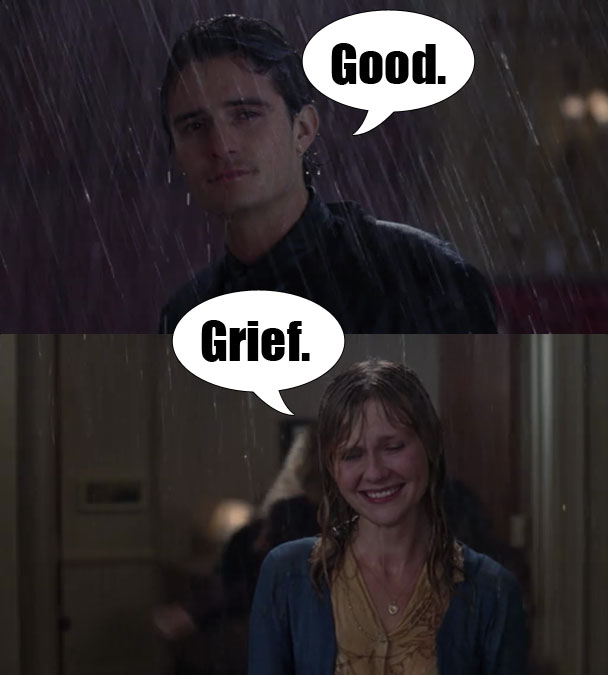
The movie's climactic moment is a memorial service that features all of the characters we have met in the movie giving some kind of their-character-appropriate tribute to Mitch. This ends with Susan Sarandon giving a rousing speech about what her life is like now without her husband. She talks about how she went temporarily crazy. She talks about how she'd always wanted to learn how to tap dance, so she took lessons. OK. She talks about how she'd always wanted to learn how to "cook organically," whatever that even means, and so she learned how to do that. Sure. And then she explains that the loss of Mitch made her realize that she needed to learn how to laugh again, and so she took stand up comedy classes. Fine. And in her defense, the movie does get kind of fuzzy on timelines and chronology, but from what I can tell that is three separate classes and MITCH HAS BEEN DEAD FOR LESS THAN A WEEK.
She ends the speech with a story about boners that CRUSHES, and then rounds out her performance with a tap-dance to "Moon River" that receives a standing ovation.
[videoembed size="full_width" alignment="center"][/videoembed]
Perhaps we are all dead, and this is hell.
What happens next I remember as being a source of particular contention in my original viewing of the movie. Kirsten Dunst, ever the coy imp, gives Orlando Bloom a map for his journey home because in their first all-night conversation she told him he simply must take a cross-country road trip. (She adds, "You really haven't traveled, have you?" which you would kind of think that a high-paid celebrity wunderkind shoe designer from Oregon-based Mercury Worldwide Shoes would have traveled at least a little bit, but guys, let's just get through this fucking thing.) Sure! OK! Romantic! Except, this map that she supposedly made for him the night before would literally take 100 production assistants 100 years of scrappbooking in 100 scrapbooks to complete.
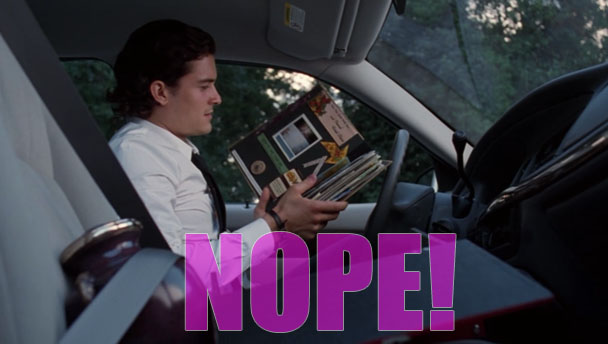
It's 1,000,000 pages long, filled with hand-drawn art, personalized photographs, collages, and mix tapes that she has supposedly timed to the minute. Fine, whatever. In an impossible world of inane cliches and empty airplanes where time has no meaning, this manic pixie dream map is the least of our problems. Because, and perhaps this is where the aforementioned vantage point of age and experience comes in, this time around re-watching Elizabethtown was when I noticed that Claire's impossible scrapbook was not nearly as bizarre as the actual road trip she sends him on. Holy smokes, WHAT IS THIS ROAD TRIP?
First, her itinerary takes him to Memphis, where she tells him to visit Sun Records. At no point in the entire movie has he ever expressed any interest in music, much less 1950s rock and roll. (Unless we are supposed to get all of that from his flip phone ring tone, in which case, still no.) Next, still in Memphis, she tells him to go to some bar where the old bartender regales him with stories about blues men. Again: he's never even mentioned the blues, much less expressed the highly detailed knowledge of blues history one would need to make sense of an old Memphis bartender's deep cut stories. Finally, still in Memphis, he visits the motel where Martin Luther King Jr. was assassinated. And he SCATTERS SOME OF HIS DAD'S ASHES THERE.

And that's the whole trip. Three places in Memphis of virtually no relevance to his character and then he hits the road again. GUYS. THIS MOVIE.
When Drew is back on the road, he begins manically talking to his father's urn because Claire's itinerary does not seem to make any allowances for stopping to sleep (seriously, she says the trip will take 41 hours, and apparently they must be contiguous) and at one point in his babbling he tells his father that his impending suicide is not his father's fault. So he's still planning on that, by the way. After having all of this time with his family, a memorial service for his father, falling in love, and visiting Sun Studios, he is still suicidal? Fine. Please, Drew, please please please for the love of God: KILL YOURSELF. But he can't kill himself yet because the mix CD tells him that in the next town he will find "The World's 2nd Largest Farmer's Market." Trying to figure out why a person who is STILL determined to kill himself would bother stopping to see the World's 2nd Largest Farmer's Market is only slightly more annoying than the fact that Cameron Crowe admits in that same article quoted above that the World's 2nd Largest Farmer's Market doesn't exist. (Lie #3,303,493,208,047*.)
Then the mix CD tells him to follow a series of scavenger hunt clues that will lead him to "a girl wearing a red hat," which is Claire, and the long and meaningful life of love and happiness that she promises. Classic stuff. One must assume, of course, that she dumped her boyfriend at this point, and that although he JUST said he was still suicidal 45 seconds earlier, that Drew has finally found his will to live. BUT: if you're willing to accept those things, AND if it doesn't bother you too much to consider the logistical complication of what it actually means for Claire to have arranged this meet cute in the first place, which is that she would have had to have RACED from Elizabethtown where they both were the day before to get to this World's 2nd Largest Non-Existent Farmer's Market early enough to then place her scavenger hunt clues, AND if you don't also wonder, after all of this effort--the impossible scrapbook, the impeccably-timed narrated CDs, the scavenger hunt clues planted in the nick of time--why Claire didn't bother to make the ultimate goal of actually finding her in the market easier and more straight-forward than Drew just being told to "find a girl in a red hat," and therefore leaving him to wander around like an asshole in what magically turns out to be A SEA of girls in red hats----as long as none of that stuff gets in the way, or any of the rest of the movie, like if you ignore the whole movie, then you might even consider it a happy ending. Or as Cameron Crowe would refer to a suicidal space alien and a cheater kissing at a make believe novelty farmer's market, a "grace note."
In conclusion, Elizabethtown is The Worst Movie Of All Time.
